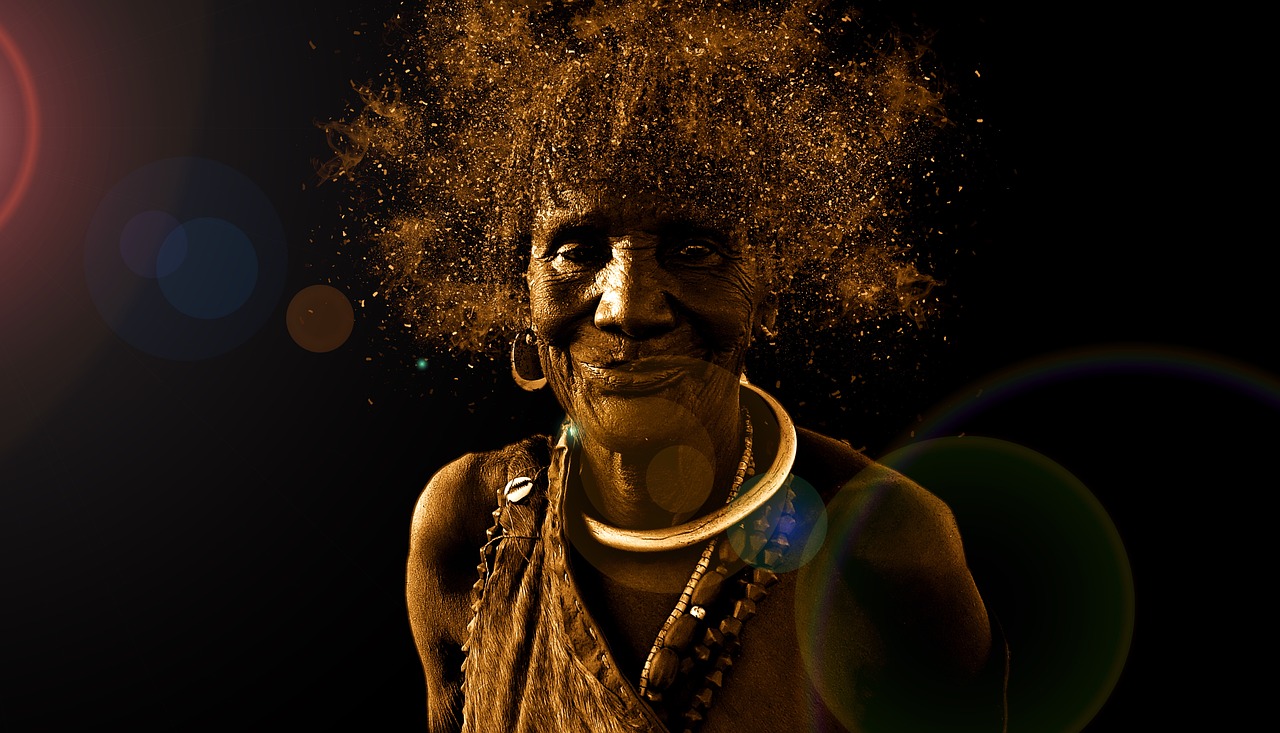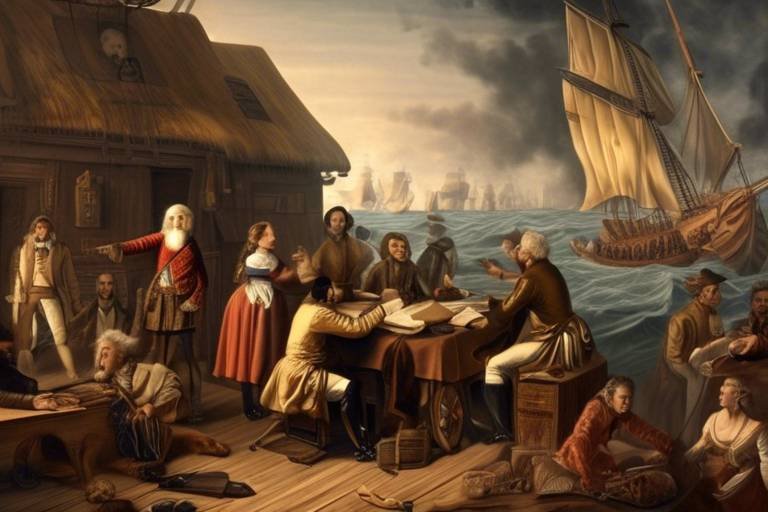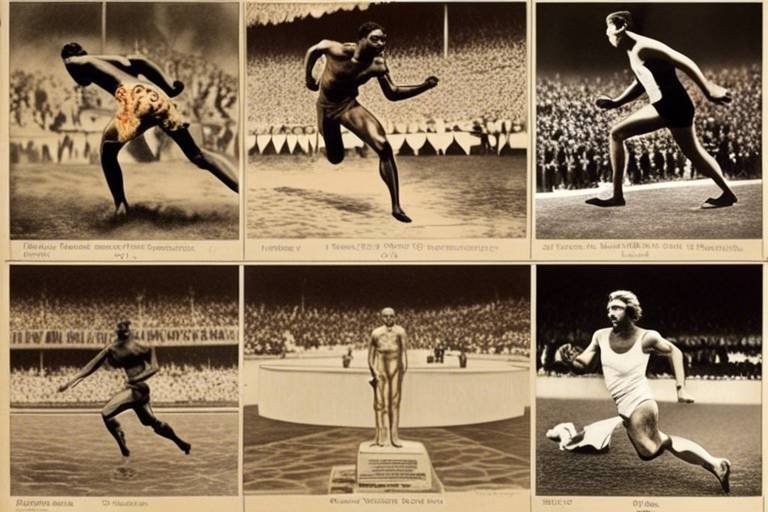The History of the African Diaspora - Key Events
Exploring the rich tapestry of the African diaspora unveils a series of key events that have significantly shaped the history and identity of people of African descent across the globe. From the harrowing era of the transatlantic slave trade to the rise of civil rights movements and the advocacy for Pan-African unity, these events have left an indelible mark on the collective consciousness of the African diaspora.
The transatlantic slave trade stands as a dark chapter in history, marked by the forcible displacement of millions of Africans to the Americas, Europe, and beyond. This brutal system not only had profound economic implications but also deeply impacted the social and cultural fabric of societies on both sides of the Atlantic.
As the abolition movements gained momentum, dedicated abolitionists tirelessly campaigned for the end of the transatlantic slave trade and the abolition of slavery itself. Their unwavering efforts, alongside key figures and pivotal events, eventually led to the abolition of slavery in various regions around the world.
The era of colonialism in Africa ushered in a period of struggle for independence, as African nations fought against European colonial rule to assert their right to self-determination. Through the leadership of African visionaries and the mobilization of grassroots movements, independence was achieved, marking a pivotal moment in African history.
Civil rights movements emerged as a powerful force for change, advocating for equality and justice in different parts of the world. From the United States to South Africa and the Caribbean, these movements, with their strategic approach and influential leaders, made significant strides in the fight against discrimination and oppression.
Pan-Africanism, with its call for unity and solidarity among people of African descent globally, has been instrumental in shaping political, cultural, and social movements. Originating from a desire for collective empowerment, Pan-Africanism continues to resonate as a unifying force within the African diaspora.
The Black Power movement, emphasizing self-determination, pride, and community empowerment, played a crucial role in advancing civil rights struggles and fostering cultural expression. Its impact on challenging systemic racism and oppression reverberated across various spheres of society.
In the 21st century, the African diaspora continues to navigate complex challenges, including issues of identity, discrimination, and cultural preservation. The quest for social justice and equality remains ongoing, as individuals within the diaspora strive to assert their voices and experiences in a rapidly changing world.
Global solidarity and advocacy have become essential pillars in addressing the multifaceted issues affecting the African diaspora. Through the collective efforts of international organizations, grassroots movements, and individuals, awareness is raised, empowerment is fostered, and meaningful change is advocated for the betterment of the global African community.

Transatlantic Slave Trade
The Transatlantic Slave Trade stands as one of the most harrowing chapters in human history, marking a period of immense suffering and exploitation. This system, lasting for over three centuries, involved the forced transportation of millions of Africans to the Americas, Europe, and other regions. The trade was driven by economic interests, with African men, women, and children treated as commodities to be bought, sold, and exploited for labor.
Ships packed with enslaved Africans endured treacherous journeys across the Atlantic, with inhumane conditions leading to high mortality rates. The impact of this brutal trade was profound, not only on the individuals directly affected but also on the societies and economies of the regions involved. The transatlantic slave trade left a lasting legacy of trauma, inequality, and injustice that continues to reverberate through the present day.
The trade not only stripped individuals of their freedom and dignity but also disrupted African societies, cultures, and economies. Families were torn apart, communities decimated, and traditional systems of governance undermined. The transatlantic slave trade reshaped the demographics and social structures of both Africa and the Americas, leaving a complex legacy that continues to shape contemporary issues of race, identity, and power dynamics.

Abolition Movements
Abolition movements were pivotal in the fight against the transatlantic slave trade and the institution of slavery. These movements were driven by individuals and organizations dedicated to eradicating the inhumane practice of enslaving Africans. One of the most prominent figures in the abolition movement was William Wilberforce, a British politician and philanthropist who tirelessly campaigned for the abolition of the slave trade. His efforts eventually led to the passing of the Slave Trade Act of 1807, which prohibited the slave trade in the British Empire.
Abolitionists utilized various strategies to advance their cause, including petitions, public lectures, and the distribution of anti-slavery literature. They sought to raise awareness about the brutal conditions faced by enslaved Africans and garner public support for the abolition of slavery. The formation of abolitionist societies, such as the Anti-Slavery Society in Britain and the American Anti-Slavery Society in the United States, played a crucial role in organizing and mobilizing anti-slavery activists.
The abolition movements faced fierce opposition from pro-slavery interests, leading to intense debates and conflicts. Despite the challenges, abolitionists remained steadfast in their commitment to ending the transatlantic slave trade and securing freedom for enslaved individuals. The efforts of abolitionists across different countries and continents eventually culminated in the abolition of slavery in various parts of the world, marking a significant victory for human rights and social justice.

Colonialism and Independence
Colonialism and Independence marked a pivotal period in the history of the African diaspora, as European powers expanded their empires across the African continent, exploiting its resources and imposing their authority. The scramble for Africa led to the carving up of the continent, with borders drawn without regard for existing ethnic or cultural boundaries. This era of colonial rule brought about significant economic exploitation, cultural suppression, and political subjugation, leaving a lasting impact on the African people.
Resistance to colonial rule grew as African leaders and movements emerged to challenge the oppressive systems in place. Visionaries like Kwame Nkrumah in Ghana, Jomo Kenyatta in Kenya, and Nelson Mandela in South Africa spearheaded the fight for independence, advocating for self-governance and the end of foreign domination. Through protests, strikes, and armed struggles, African nations gradually gained their independence, reclaiming their sovereignty and forging new national identities.
The legacy of colonialism continues to shape the socio-economic landscape of many African countries, with the effects of exploitation and division still evident today. The struggle for true independence extended beyond political sovereignty to encompass economic self-sufficiency, cultural revival, and social justice. Post-independence challenges, such as corruption, neocolonialism, and ethnic conflicts, have posed obstacles to the realization of the full potential of African nations.
Despite the complexities and setbacks, the era of Colonialism and Independence stands as a testament to the resilience and determination of the African people to chart their own destinies. The struggles and sacrifices made during this period laid the foundation for a renewed sense of pride, unity, and solidarity among the diverse communities of the African diaspora, inspiring future generations to continue the fight for a more just and equitable world.

Civil Rights Movements
The Civil Rights Movements hold a significant place in history, marking a pivotal period of activism and change in the quest for equality and justice. These movements, spanning various regions such as the United States, South Africa, and the Caribbean, were characterized by a strong determination to challenge systemic racism and discrimination.
In the United States, the Civil Rights Movement of the 1950s and 1960s, led by prominent figures like Martin Luther King Jr., aimed to end racial segregation and secure equal rights for African Americans. Through nonviolent protests, marches, and legal challenges, the movement made significant strides in dismantling discriminatory laws and practices.
In South Africa, the struggle against apartheid saw leaders like Nelson Mandela and organizations like the African National Congress (ANC) fighting against the oppressive policies of the apartheid regime. The movement culminated in the eventual dismantling of apartheid and the establishment of a democratic, multiracial society.
Similarly, in the Caribbean, movements for civil rights and independence from colonial rule were driven by a desire for self-determination and equality. Figures like Marcus Garvey in Jamaica and Frantz Fanon in Martinique advocated for the empowerment of black communities and the rejection of colonial oppression.
Across these movements, the emphasis on nonviolent resistance, grassroots organizing, and coalition-building was central to their success. By mobilizing communities, raising awareness of injustices, and demanding political change, the Civil Rights Movements inspired generations of activists and paved the way for greater inclusivity and social progress.

Pan-Africanism
Pan-Africanism is a powerful ideology and movement that aims to unite people of African descent worldwide, fostering solidarity and advocating for their rights and empowerment. It emerged as a response to the long history of oppression, exploitation, and discrimination faced by Africans and people of African descent across the globe. At its core, Pan-Africanism seeks to promote the dignity, equality, and self-determination of individuals of African heritage, emphasizing the importance of cultural heritage and shared experiences in shaping a collective identity.
One of the key principles of Pan-Africanism is the belief in the interconnectedness of all people of African descent, regardless of their geographical location. This ideology highlights the common struggles and aspirations shared by individuals within the African diaspora, emphasizing the need for unity and collaboration to address systemic injustices and challenges faced by the community. Pan-Africanism also advocates for the recognition and celebration of African culture, history, and achievements, promoting a sense of pride and belonging among individuals of African descent.
Throughout history, Pan-Africanism has been instrumental in inspiring political, cultural, and social movements aimed at advancing the rights and interests of people of African heritage. Visionary leaders such as Marcus Garvey, W.E.B. Du Bois, and Kwame Nkrumah played pivotal roles in promoting Pan-African ideals and fostering solidarity among African communities worldwide. These leaders advocated for collective action, mutual support, and the pursuit of common goals to combat racism, colonialism, and other forms of oppression affecting people of African descent.
Moreover, Pan-Africanism has been closely linked to the fight against imperialism, advocating for the decolonization of African nations and the establishment of independent, self-governing states. The ideology has inspired liberation movements and independence struggles across the African continent, shaping the course of history and paving the way for the emergence of sovereign African nations. Pan-Africanism continues to influence contemporary political discourse, cultural expression, and social activism, serving as a powerful force for unity, justice, and progress within the global African community.

Black Power Movement
The Black Power Movement was a significant social and political movement that emerged in the 1960s, emphasizing self-determination, racial pride, and community empowerment among African Americans. It sought to challenge systemic racism and oppression, advocating for political and economic independence within the Black community.
One of the key figures associated with the Black Power Movement was Malcolm X, who promoted Black nationalism and self-defense as a means to combat racial discrimination. His powerful speeches and advocacy for Black empowerment resonated with many African Americans seeking a more assertive approach to civil rights and equality.
The movement also inspired cultural expressions of Black pride and identity, influencing music, art, literature, and fashion. The iconic raised fist symbol, representing solidarity and resistance, became synonymous with the Black Power Movement and its call for unity and strength in the face of adversity.
Organizations like the Black Panther Party played a crucial role in the Black Power Movement, advocating for community self-defense, social programs, and political activism. Their commitment to addressing issues of poverty, police brutality, and inequality made them a powerful force in the fight for racial justice.
While the Black Power Movement faced criticism for its confrontational tactics and perceived militancy, it undeniably sparked important conversations about race, power dynamics, and the need for Black liberation. Its legacy continues to influence contemporary social justice movements and discussions on systemic racism and inequality.

African Diaspora in the 21st Century
In the 21st century, the African diaspora continues to navigate a complex landscape shaped by historical legacies and contemporary challenges. The diaspora, dispersed across the globe, grapples with issues of identity, discrimination, and the preservation of cultural heritage in a rapidly changing world. As globalization accelerates and technology connects distant communities, members of the African diaspora are forging new paths while confronting persistent barriers.
One of the defining features of the African diaspora in the 21st century is the quest for social justice and equality. Activists and advocates within the diaspora are at the forefront of movements addressing systemic racism, economic disparities, and political marginalization. Through grassroots organizing, social media campaigns, and international collaborations, individuals and organizations are working to amplify the voices of the diaspora and challenge oppressive structures.
Furthermore, the 21st century has witnessed a resurgence of interest in African culture and heritage among diasporic communities. From music and fashion to literature and cuisine, the rich tapestry of African traditions is being celebrated and reimagined in global contexts. This cultural renaissance not only fosters a sense of pride and belonging among diaspora members but also promotes cross-cultural exchange and understanding.
However, the African diaspora in the 21st century also faces significant obstacles, including ongoing discrimination and marginalization in various spheres of life. From education and employment to healthcare and housing, diaspora communities continue to encounter systemic barriers that perpetuate inequality and limit opportunities for advancement. Addressing these challenges requires collective action, advocacy, and solidarity both within the diaspora and with allies across the globe.
As the African diaspora navigates the complexities of the modern world, individuals and communities are redefining what it means to be part of a global network of African descent. By embracing their diverse histories, cultures, and experiences, members of the diaspora are shaping a future that is rooted in resilience, empowerment, and solidarity.

Global Solidarity and Advocacy
Global Solidarity and Advocacy play a crucial role in addressing the challenges and issues faced by the African diaspora around the world. It involves fostering unity and collaboration among individuals, communities, and organizations to advocate for the rights and well-being of people of African descent. Through global solidarity, individuals from diverse backgrounds come together to support and amplify the voices of those affected by discrimination, inequality, and injustice.
International organizations such as the United Nations, African Union, and various non-governmental organizations play a significant role in promoting advocacy efforts and raising awareness about the issues impacting the African diaspora. These organizations work to create platforms for dialogue, mobilize resources, and implement programs that address the social, economic, and political challenges faced by individuals of African descent.
Grassroots movements also play a vital role in advocating for the rights of the African diaspora. These movements are often led by community organizers, activists, and advocates who work tirelessly to address systemic issues such as racism, xenophobia, and social inequality. By organizing protests, campaigns, and educational initiatives, grassroots movements strive to bring about positive change and empower marginalized communities.
Individuals can also contribute to global solidarity and advocacy efforts by educating themselves about the history and experiences of the African diaspora, supporting initiatives that promote diversity and inclusion, and speaking out against discrimination and injustice. By standing in solidarity with those affected by systemic oppression, individuals can help create a more equitable and just society for all.
Frequently Asked Questions
- What is the African diaspora?
The African diaspora refers to the global community of people of African descent who are dispersed outside the African continent. This includes individuals and communities who are descendants of enslaved Africans, migrants, and refugees who have settled in various parts of the world.
- What were the key events that shaped the African diaspora?
Significant events that shaped the African diaspora include the transatlantic slave trade, abolition movements, colonialism, civil rights movements, Pan-Africanism, the Black Power movement, and the contemporary experiences of the African diaspora in the 21st century.
- Why is Pan-Africanism important?
Pan-Africanism is important as it advocates for the unity and solidarity of people of African descent worldwide. It promotes cultural awareness, political empowerment, and social justice for individuals and communities of African heritage across the globe.
- How can global solidarity help the African diaspora?
Global solidarity can help the African diaspora by fostering awareness, advocacy, and support for issues affecting people of African descent. It can lead to positive change, empowerment, and the promotion of equality and justice for individuals within the diaspora.



















